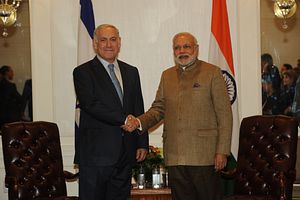Indian Prime Minister Narendra Modi is set to become the first prime minister of India to visit Israel. He will travel there later this year and will discuss strategic and economic cooperation with the Israeli leadership.
The specific date of Modi’s visit remains uncertain, but, according to statements by India’s external affairs minister, Sushma Swaraj, the visit will come at some time after July, after preliminary high-level bilateral diplomatic talks with the Israeli government. Swaraj served as the head of the Indo-Israel Parliamentary Friendship Group from 2006 to 2009, and has long seen Israel as a “reliable partner” for India. Ahead of Modi’s visit, Swaraj will visit Israel, Jordan, and the Palestinian territories.
Modi has had somewhat of a storied personal political history with Israel, even before he became prime minister. He visited Israel as the chief minister of Gujarat, back in 2006. Back then, Modi had promised to return should he become the country’s prime minister. In 2015 — nine years later — he’s keeping that promise.
When India went to the polls in 2014, Modi was seen as “Israel’s best friend in South Asia.” Thus, both Modi and the Israeli leadership have held each other in high regard for some time now. While in opposition, Modi’s party, the Bharatiya Janata Party (BJP) was often critical of what it saw as the United Progressive Alliance (UPA) government’s tendency to inadequately criticize Hamas, and other pro-Palestinian groups, for their use of violence against Israel.
Since taking the prime minister’s office, Modi has continued India’s rapprochement with Israel. Last year, Modi’s meeting with Benjamin Netanyahu, the Israeli prime minister, marked the first prime minister-level meeting between India and Israel since former Israeli Prime Minister Ariel Sharon visited New Delhi. Following the Modi-Netanyahu encounter, India’s home minister and senior BJP leader, Rajnath Singh, visited Israel, where he received assurances from Israeli Defense Minister Moshe Ya’alon that Israel was “ready and willing” to share military technology with India.
Indeed, under the Modi government, India and Israel have ramped up their cooperation on security and defense matters. In late 2014, the Indian Navy opted to purchase the Barak-1 missile, manufactured by Israel Aerospace Industries. Later that year, India opted for Israel’s Spike anti-tank guided missiles over the United States’ competing Javelin offering.
India’s ongoing rapprochement with Israel could end up having implications for how New Delhi interacts with Arab states in the future. Previously, under both BJP-led and Congress-led governments, New Delhi opted for a policy of interacting equally with Israel and Arab states, playing a balancing game (see: “India’s Misunderstood Israel Policy” and “The Myth of India’s ‘Shift’ Toward Israel“).

































